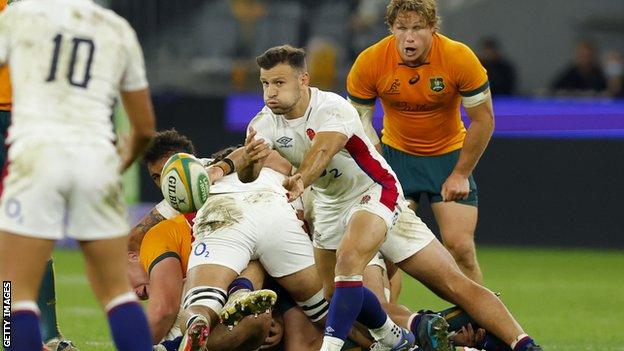
Throughout 2021, Eddie Jones regularly referred to 'New England' - a nod not just to a change in personnel in his side but also a shift in style.
Before that year's autumn series, stalwarts such as Jamie George, Billy and Mako Vunipola, and George Ford were dropped as Jones made his move.
And glimpses of 'New England' were clear in the thrilling victory over South Africa as they upset the Springboks with enterprising rugby despite the forwards being overpowered.
But the side's development and identity stalled during the Six Nations, and in the defeat by Australia in Perth, England looked stuck between styles. The forwards were well matched by the Wallabies, and the Marcus Smith-Owen Farrell partnership failed to click.
On Saturday in Brisbane, however, the snarl was back, with the pack on the front foot and England returning to a kicking game to exert pressure. The result was a 25-17 victory that levelled the series.
"We did play differently - it was a bit simpler in the second Test," scrum-half Danny Care, who is back in the England set-up after a four-year hiatus, said on the Rugby Union Weekly podcast he co-hosts.
Inside centre Farrell, who has not been at his best since the 2019 World Cup, was authoritative, and three of the players dropped just eight months ago - George and the Vunipola brothers - played key roles, with Billy Vunipola especially outstanding.
So what does this mean for the series decider in Sydney on Saturday, and for Jones' side over the next 18 months leading up to the 2023 World Cup? Has 'New England' become 'Old England'?
"There are a few things being tweaked at the moment to try and find the perfect gameplan for this team," said Care.
"The first 20 minutes of the second Test is how we want to play, in terms of being confrontational and physical, but then forcing pressure on the opposition through a good tactical kicking game.
"Our big learning from the first Test is we over-thought a lot of things. We thought the game would be played in this type of way, and then it wasn't.
"In the second Test, we took rugby back to its finest form of running hard, winning collisions, winning gain-line and playing quickly where the space was."
But where does that leave fly-half Smith - a natural runner of the ball who ended up kicking the ball 10 times in the second Test? Harlequins club-mate Care hopes Smith will still be given the licence to play, regardless of the gameplan.
"What we have to do as a team is allow Marcus to do his special bits, because he will do the special bits if we do the stuff we talked about - of being physically abrasive, winning contacts, smashing breakdowns and playing quickly," added Care.
"Marcus is one of the most gifted players in England. He can do stuff we can't do, but we have to put him in situations where he has the ability to do that.
"We can't just throw him the ball and say: 'Go and do it.' You have to work out ways to put him in positions where he can then use his unbelievable decision-making and his skill and his execution.
"To do that we have to be the English team we want to be. We want to have the best forward pack in the world and we want to play quicker than everyone, and we have to create spaces for Marcus to do his thing."
Former England wing Ugo Monye added: "I would like to see Marcus play more, but I looked at the Australia back three and wondered what on earth they are doing.
"If I am analysing them, I am getting the ball in behind them [with the boot]. That is a simple tactic where England can really make hay.
"So you have to get through A and B first before you see C, with C being the magic stuff."
Care is also conscious of the need to be flexible and avoid falling into the kick-first trap that stilted England's progress through 2020, when they won matches yet struggled to create.
"We want to have an all-court game," said Care.
"The perfect scenario is you have every single option covered, because we have got guys like Marcus and 'Faz' [Farrell] that can spot things so much quicker than a normal person can."
The second Test win was hugely significant, not just because it ended England's losing streak and got them back into the series, but because it avoided any further scrutiny on Jones' position after four losses in six Tests in 2022.
England also played with the kind of clarity and purpose which had largely been absent over the past few years, albeit still a little short of the killer instinct required to turn pressure into points.
How Jones sets up the team tactically for the series decider in Sydney, and whether he is tempted to go back to the future at next year's tournament in France, will be especially intriguing.


Source: BBC Rugby Union News
